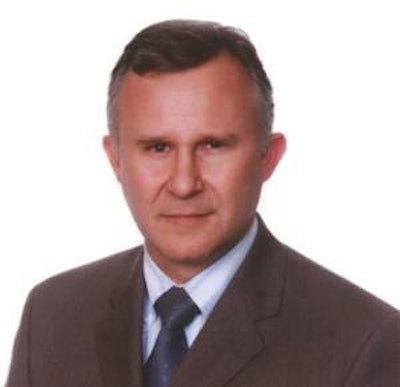
Dr. Clovis Rayzel, president of Big Dutchman USA since 2005, has extensive experience in intensive animal agriculture. He earned his veterinary medical degree from his native country of Brazil and after pursuing post graduate studies in the Netherlands and obtaining a master’s degree from South Dakota State University he was involved in broiler, egg and pork production with a large integrator in his home country. He joined Big Dutchman in 1997 as a marketing manager for Latin America and was then promoted to vice president of international sales, requiring relocation to Holland, Michigan.
Egg Industry: How can equipment manufacturers enhance profitability of their clients?
Clovis Rayzel: Advances in technology and production procedures have extended the operational life of equipment. Overall quality and reliability are superior to installations of ten to fifteen years ago. Innovations such as steel coating technology using Galfan zinc and aluminum coating of wire mesh prolongs durability and is standard for Big Dutchman cages.
Improvements in egg collections have allowed substantial decreases in breakage. Computerized controls allow producers to track production parameters including feed conversion, labor utilization, egg yield and livability.
EI: How has equipment design changed during the past decade?
CR: The most significant change is the almost complete transition from high-rise houses to belt batteries. If we go back ten years most equipment manufacturers either didn’t offer belt batteries or had imperfect designs. Currently there are many companies with competitive products. Big Dutchman has positioned itself to be a leader in egg production systems both globally and for the U.S. market. Several of our manure belt products are already in their fourth generation, incorporating many improvements.
The second development area has been in the area of improved air quality through upgrading ventilation. This not only improves hen performance but also prolongs the life of equipment.
Computerized controls have revolutionized control of egg flow to plants in in-line complexes.
EI: How do you review acquisitions and consolidations within the U.S. egg industry?
CR: In this respect our industry has more similarities than differences when compared to other segments of the economy. Consolidations and acquisitions will continue and are inevitable. Some will be successful and other mergers or takeovers are counterproductive. Size can often create focus through organization and coordination. Large groups are frequently better equipped to deal with challenges such as high ingredient costs and regulatory restraints.
EI: Big Dutchman recently acquired Poultry Management Systems. How will this improve your product line?
CR: Poultry Management Systems Inc. is a market leader in computerized systems for egg production. We anticipate a high degree of synergy from the association since their products enhance the functionality of large installations.
EI: How will the industry respond to welfare initiatives such as in California and Michigan?
CR: Most people in our industry concede that animal welfare is a significant issue and will be with us for many years to come. This is not only a state issue but there are implications for both NAFTA and U.S. interstate commerce. Producers must consider not only how they will house their hens in the states where they are located but also whether they will be able to market their eggs elsewhere. I am optimistic with regard to the ability of U.S. egg producers to respond to this challenge.
EI: Does your association with a parent company in Europe have any influence on your approach to designing and marketing “animal-friendly” systems?
CR: We have the benefit of the experience of our European colleagues who have been confronted with welfare regulation for many years. We have done our best to make this experience available to U.S. egg producers and organizations. Our approach is to work with our clients to help them make the best decisions. Our product line is broad enough to cover the needs of our customers and our engineers are willing to customize products as required.
EI: What future products can we expect from Big Dutchman?
CR: We always have several projects under development. Our most recent innovation into the U.S. market is the Avech Colony System which we believe will allow producers the flexibility to conform to future requirements.
We are actively working on improving the control of air quality, processing of manure and feed handling. We are in the final stages of adapting egg imaging technology which could be of benefit in enhancing quality and diagnosing problems. We anticipate that a new product will enhance traceability which is emerging as a significant production and safety issue.
EI: What is your long-term vision for the U.S. egg industry?
CR: We believe that we will see further consolidation. Many companies will explore new market opportunities. Traceability will become more important. Improved ventilation and control of egg flow will enhance saleable yield and constrain cost escalation. Regardless of foreseeable challenges, the U.S. industry has a bright future. We are a large market with competitive mature and well-managed egg production companies. These are characteristics that will allow Big Dutchman to remain competitive and to provide consumers with a nutritious and economical source of protein and energy.

















